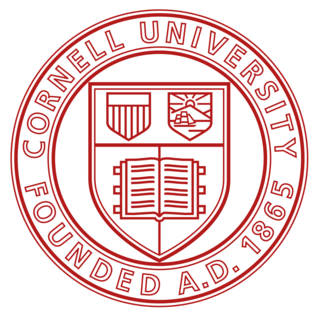The DeWitt Wallace Institute of Psychiatry: History, Policy, and the Arts at Weill Cornell Medical College in New York, was formerly known as The History of Psychiatry Section. Founded in 1958 by Dr. Eric T. Carlson, the Institute is devoted to the study of the history of the mind-sciences and the preservation of resources on the history of psychology, psychiatry, psychoanalysis, neuroscience and other related disciplines. Its companion library, the Oskar Diethelm Library, houses over 50,000 titles on these subjects, with the earliest dating to the 14th century. The present Director is George Makari.

Sanford I. "Sandy" Weill is an American banker, financier and philanthropist. He is a former chief executive and chairman of Citigroup. He served in those positions from 1998 until October 1, 2003, and April 18, 2006, respectively.
The NewYork-Presbyterian Hospital is a nonprofit academic medical center in New York City affiliated with two Ivy League medical schools, Cornell University and Columbia University. The hospital comprises seven distinct campuses located in the New York metropolitan area. The hospital's two flagship medical centers are Columbia University Irving Medical Center and Weill Cornell Medical Center.
Jack David Barchas, M.D. is the Barklie McKee Henry Professor and Chairman of the Department of Psychiatry at the Weill Cornell Medical College of Cornell University and the Psychiatrist-in-Chief of the New York-Presbyterian Hospital/Weill Cornell Medical Center and the Payne Whitney Psychiatric Clinic. He was formerly the Nancy Friend Pritzker professor in psychiatry at Stanford University and dean of research and neuroscience at the University of California, Los Angeles School of Medicine.
Robert Michels is a Professor of Medicine and of Psychiatry at Weill Cornell Medical College and a training and supervising psychoanalyst at the Columbia University Center for Psychoanalytic Training and Research.
Richard Alan Friedman is professor of Clinical Psychiatry at Weill Cornell Medical College, attending psychiatrist at NewYork–Presbyterian Hospital and director of Psychopharmacology at the Payne Whitney Psychiatric Clinic. He is expert in the pharmacologic treatment of personality, mood and anxiety disorders, obsessive–compulsive disorder, PTSD and refractory depression.
Theodore Shapiro is a psychiatrist and psychoanalyst in New York, where he is a professor emeritus in psychiatry and pediatrics at Weill Cornell Medical College and the Payne Whitney Psychiatric Clinic. He is a faculty member of the Columbia University Center for Psychoanalytic Training and Research and a training and supervising psychoanalyst at the New York Psychoanalytic Institute.

George Jack Makari is a psychiatrist and historian. He serves as director of the DeWitt Wallace Institute of Psychiatry: History, Policy, and the Arts, which encompasses the Oskar Diethelm Library at Weill Cornell Medical College, where he is also a Professor of Psychiatry. Makari's work has been widely reviewed, and he is well known among historians of the mind sciences, psychiatry, and psychoanalysis for Revolution in Mind, The Creation of Psychoanalysis and Soul Machine: The Invention of the Modern Mind. His recent work, Of Fear and Strangers: A History of Xenophobia, won the 87th annual Anisfield-Wolf Book Award in the nonfiction category. He was the Director and Attending Psychiatrist of a sliding scale Psychotherapy Clinic at Payne Whitney Clinic from 1991-2016.
Dr. David Silbersweig is chairman of psychiatry at Brigham and Women's Hospital in Boston, where he also co-directs the center for the neurosciences. He was an academic dean at Harvard Medical School, and is Stanley Cobb Professor of Psychiatry there.
James Kocsis is professor of psychiatry at Weill Cornell Medical College and Payne Whitney Psychiatric Clinic. His clinical research trials focused on the treatment of chronic depression, initially with antidepressant medications and, more recently, with psychotherapy. These studies were pivotal in the reconceptualization of depressive neurosis, a personality disorder, into dysthymia, a variant of major depression.
Robert B. Millman, was an American physician and former Saul Steinberg Professor of Psychiatry and Public Health at Weill Cornell Medical College, where he was the Director of the Drug and Alcohol Abuse Treatment and Research Service at New York-Presbyterian Hospital. He served in this role from 1987, until his retirement in 2009. Dr. Millman counseled and helped many people deal with and over come addiction from his office on east 35th Street in New York. Millman was the author of more than 100 scientific papers and book chapters and an editor of the Comprehensive Textbook of Substance Abuse. He was a member of the Board of Directors of Drug Strategies, a national non-profit research institute that promotes effective drug abuse prevention, education, and treatment, and an advisor to the State and Federal Governments. He was the former Medical Director for Major League Baseball, where he was an advisor on performance-enhancing supplements and steroids.

Weill Cornell Medicine-Qatar (WCM-Q) is a branch of Weill Cornell Medicine of Cornell University, established on April 9, 2001 following an agreement between Cornell University and the Qatar Foundation for Education, Science and Community Development. It is located in Education City, Qatar, near the capital of Doha.

The Weill Cornell Graduate School of Medical Sciences (WCGS) is a graduate college of Cornell University that was founded in 1952 as an academic partnership between two major medical institutions in New York City: the Weill Cornell Medical College and the Sloan Kettering Institute. Cornell is involved in the Tri-Institutional MD-PhD Program with Rockefeller University and the Sloan Kettering Institute; each of these three institutions is part of a large biomedical center extending along York Avenue between 65th and 72nd Streets on the Upper East Side of Manhattan.

The Joan & Sanford I. Weill Medical College of Cornell University is Cornell University's biomedical research unit and medical school in New York City. It is affiliated with NewYork-Presbyterian Hospital, Weill Cornell Medical Center, Hospital for Special Surgery, Memorial Sloan Kettering Cancer Center, and Rockefeller University, all of which are located on or near York Avenue and Sutton Place.

The Tri-Institutional MD-PhD Program is an MD-PhD program based in New York City that was formed by combining earlier MD-PhD programs that had their inceptions in 1972. The current version of the program, which is operated by Weill Cornell Medicine, Rockefeller University, and Memorial Sloan Kettering Cancer Center's Sloan Kettering Institute, was created in 1991.

Cornell University is a private Ivy League statutory land-grant research university based in Ithaca, New York. The university was founded in 1865 by Ezra Cornell and Andrew Dickson White. Since its founding, Cornell has been a co-educational, non-sectarian institution where admission has not been restricted by religion or race. The student body consists of more than 15,000 undergraduate and 10,000 graduate students from all 50 American states and 119 countries.

Bernard Sachs was an American neurologist.
Alton Meister (1922–1995) was an American biochemist who made pioneering contributions to the study of glutathione metabolism.
Joseph Wortis was an American psychiatrist, longtime editor of the scientific journal Biological Psychiatry, and a professor at the State University of New York at Stony Brook.
Beatrix A. Hamburg was an American psychiatrist whose long career in academic medicine advanced the field of child and adolescent psychiatry. Hamburg was the first known African-American to attend Vassar College, and was also the first African-American woman to attend Yale Medical School. Hamburg held professorships at Stanford, Harvard, Mt. Sinai and—most recently—at Weill Cornell Medical College. She was on the President's Commission on Mental Health under President Jimmy Carter. Hamburg was a president of the William T. Grant Foundation, and also directed the child psychiatry divisions at Stanford University and Mount Sinai. She originally was going to go into pediatric medicine, but instead found herself interested in psychiatry. She researched early adolescence, peer counseling, and diabetic children and adolescents. She was a member of the National Academy of Medicine and a fellow of the American Association for the Advancement of Science. She received a Foremother Award for her lifetime of accomplishments from the National Research Center for Women & Families in 2012.

David John Impastato, M.D. – born January 8, 1903, died February 28, 1986 – was a neuropsychiatrist who pioneered the use of electroconvulsive therapy (ECT) in the United States. A treatment for mental illness initially called "electroshock," ECT was developed in 1937 by Dr. Ugo Cerletti and Lucio Bini, working in Rome. Impastato has been credited with the earliest documented use of the revolutionary method in North America, administered in early 1940 to a schizophrenic female patient in New York City. Soon after, he and colleague Dr. Renato Almansi completed the first case study of ECT to appear in a U.S. publication. Impastato spent the next four decades refining the technique, gaining recognition as one of its most authoritative spokesmen. He taught, lectured widely and published over fifty articles on his work. He called on ECT practitioners to observe the strictest protocols of patient safety, countered resistance to ECT from both the medical and cultural establishments, and met later challenges to electroconvulsive therapy from developments in psychopharmacology. Impastato would live to see ECT recommended by the American Psychiatric Association for a distinct core of intractable mental disorders. The U.S. Food and Drug Administration took longer to respond to the treatment's potential. But in 2016 the FDA drafted guidelines for ECT similar to those of the APA, as well as proposing regulations for treatment with Class II and Class III devices. Though still not free of controversy, electroconvulsive therapy is the treatment of choice for an estimated 100,000 patients a year in the United States.